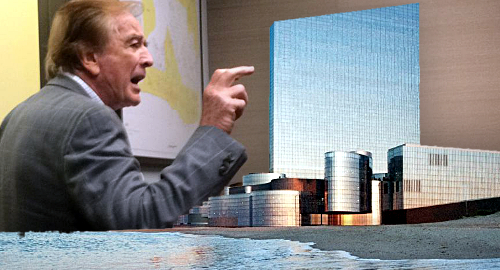 UPDATE: To virtually no one’s surprise, Straub has told the Associated Press: “Categorically, there is no deal.”
UPDATE: To virtually no one’s surprise, Straub has told the Associated Press: “Categorically, there is no deal.”
Atlantic City’s long-shuttered Revel casino hotel could reopen this spring after reports that the property has been sold to a Colorado-based developer.
On Monday, Moody’s Investors Service reported that AC Ocean Walk, a subsidiary of TEN RE AC NJ, which is turn majority-owned by Mile High Dice, which is under the control of Colorado developer Bruce Deifik, plans to acquire the shuttered Revel from owner Glenn Straub for $200m.
For the record, this is the third time that Deifik’s group has been linked to a sale of Revel in as many months, following earlier reports in October and again in November, both of which were vehemently denied by Straub (pictured). Straub has yet to publicly comment on the Moody’s report and the Press of Atlantic City reported that the Atlantic County Clerk’s Office still doesn’t have an official record of sale on file.
Deifik’s group reportedly plans to spend an additional $175m sprucing up the joint and (presumably) clearing out the rats that will have eaten through the property’s electrical wiring since Revel closed its doors in September 2014.
Moody’s also claimed that the reopened Revel would feature 2k slot machines, 100 gaming tables, 1,400 hotel rooms, 13 restaurants and the usual assortment of night clubs, pools, spas and other rat-free non-gaming amenities.
Moody’s claimed that Revel’s new owners plan to reopen the property by May 2018, a target that appears wildly optimistic. That timeline would also put Revel on track to reopen just as Hard Rock International plans to open its Hard Rock Atlantic City – the former Trump Taj Mahal – following its own nine-figure facelift that began earlier this year.
Revel was pitched as the stagnant AC market’s savior when it opened in 2012 at a staggering cost of over $2.4b. But the property quickly went from great white hope to great white elephant, failing to attract much of a crowd and ultimately declaring bankruptcy twice in two years.
In 2015, Straub paid $82m for Revel but his plans to reopen the venue for gaming hit a snag when he balked at submitting himself to the traditionally invasive probing required by gaming regulators. Regardless, a $200m sale would represent a nice return on a two-year investment, provided Straub is willing to admit publicly that the deal is done.